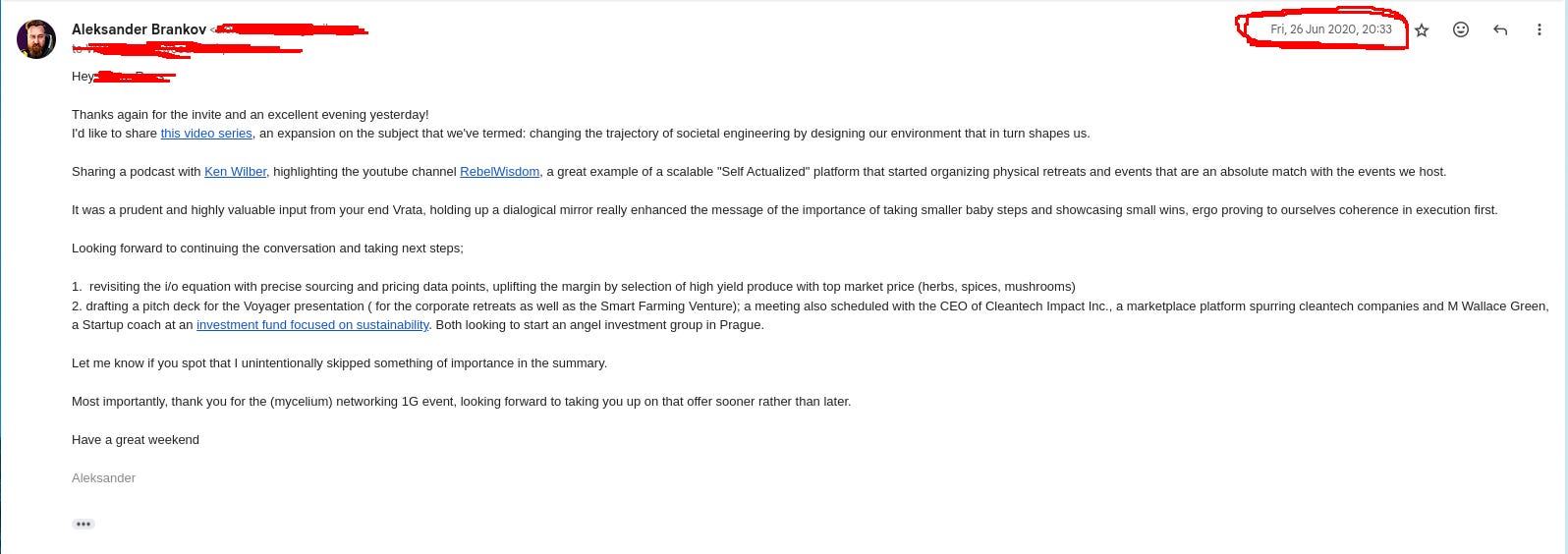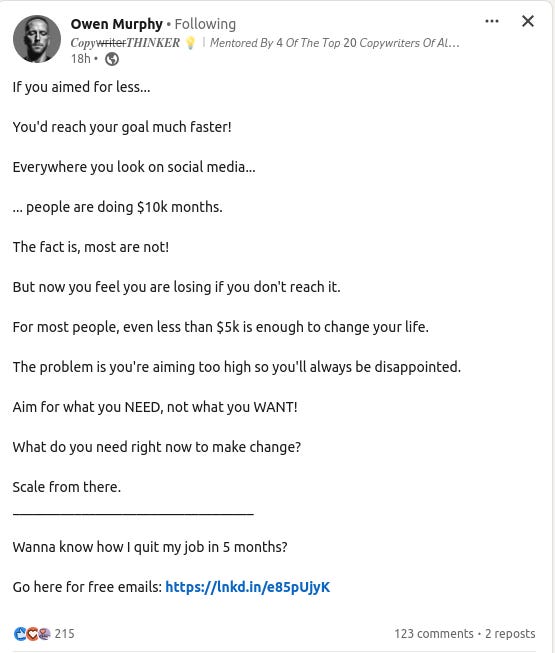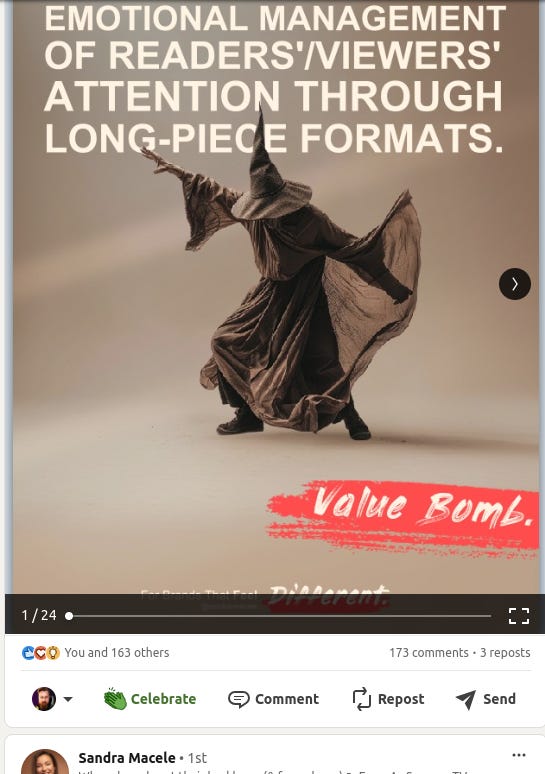- Creation Codes
- Posts
- you want to get paid by the internet
you want to get paid by the internet
but fear going north of the (corporate) wall...
I wrote this piece right after clicking exit Zoom room.
Talking to a friend/brand-new-solopreneur.
He GOT fired. (happy about it he was…)
Tired of being dragged through the corporate grindwheels…
1 foot through the door anyway.
Flirting with entrepreneurship.
Actively dating, kind’a…

there’s no point in playing pretend… you showed your hand
Anyway.
My friend. Curious. Excited. And slightly panicked.
(the good stuff, keeping you up at night without coffee)
He wanted to know everything.
(No, not Jon Snow)
I shared what I knew.
The ups and downs.
Watch out for the waterfall kinda’ stuff…
Not gatekeeping the good stuff…
Like, what’s that all about?
Look around you. (meaning…ask perplexity or GPT lately...)
Are we lacking tactics, blueprints, and strategies?

No… A definite NO. But we’re starving for action takers…
Don’t take my word for it. (even if I give them away for a living)
Ask any season 8 surviving GOT character…
Anywho… my friend.
He’s made of that cloth, suggesting this was a good move…
Asking great questions:
Why is LinkedIn a good idea for building my biz?
Looks like there are rules to writing on LinkedIn?
Unsure how YOU’d answer these?
Yet, feel like getting employed by the internet folk is a good idea.
Then hang around.
(BTW congrats, you’re at least as crazy as the average subscriber on this list)
Tis’ how you know you’re in the right spot.
We got this.
I weaned off my monthly salary tit on February 2022
Living proof that’s actually a thing.
(look at me, all grown up and sh*t :))
As a father of 2 and husband of 1.
Sole master of coin…
Chief Spiritual Development…
and stuff.
I’ll tell you this.
Noone can prepare you for this sh*t.

What she said…
You just have to take the plunge.
Off the deep end, you go… never to be seen again.
(in your existing form)
(LinkedIn) Copywriting 101.
My 5 years of word writing wisdom.
Distilled for you into these 7 rules of writing.
That’s a whopping 1.4 Rule for every year of experience.
Before we dive in.
Let’s make sure we’re on the same page.
Writing is the single most important meta-skill.
PERIOD.
To master Entrepreneurship.
You need to master writing.
The Internet swallowed communication.
Written words are the building blocks.
- Video scripts.
- Webpage copy.
- Blogs and articles.
- Social media content.
- Email and newsletters.
If you’re just starting out.
You want to avoid staring at a blank screen.
Struggling to frame your thoughts.
Taking hours to hit publish.
Giving up in frustration.
If the thought of writing regularly scares you.
But you want to get better at writing.
Or you want to launch a:
podcast
newsletter
landing page
social media account
This is written for you.
Let’s dive in.

Write like there’s no tomorrow.
Did you miss last week’s edition on intentionally designing your environment?
It’s a master key to changing behavior and skipping self-sabotage loops. Tune in to slash unhealthy patterns and burn through internal conflict once and for all.
The proud sponsor of these letters is yours truly in Your Creative Corner.
Investing the most precious of resources known to man. Time.
In collaboration with this Creative Flow Inducing Tune.
Had it on repeat for an entire week not long ago.
It’s a primer to this Copywriting 101 article.
So do me a quick favor.
Grab your headset.
& turn up the volume:
TLDR;
If you want to master the art of online business, you need to master writing.
It’s what the internet is built upon. (Yes coding is a form of writing too you smartass)
Building a life as a thriving creator.
Building a personal brand.
Building a community.
Growing an audience.
Launching a service, product, course,…
Making (digital) stuff.
Marketing magnetically.
Selling your stuff like a superstar.
All on the other side of:
effective persuasion
compelling writing
clear thinking
Which requires the mastery of the art and science of writing.
So how do you master writing?
Mastering the rules.
Before proceeding to break the rules.
To become unmistakable, and recognizable for STYLE.
Here it goes:
Study the greatest writers of all ages (And the best marketers, and the best ads)
Study psychology and persuasion (Observe emotions, responses, behaviors)
Start with the intention for everything you write (What’s the point of this piece?)
Write first and edit later (These are two separate processes, do them separately)
Write like you speak (to a good friend. If you’re not a poet, you’re doing it wrong)
Write like you’re singing a (good) song (use cadence, length, variation, intonation)
Make good use of empty space (study Eastern Zen painting techniques)
The intention of every line you write.
Is to get the reader onto the next line.
Most (great) writers spend 20% of their time writing the first draft and 80% editing.
They apply the Pareto’s rule to headlines too.
“If you write a masterpiece.
Does it really exist if noone reads it?”
The headline either stops people in their tracks.
Or they choo choo scrolling onward.
Study magazines, newspapers, and especially tabloids to learn to write headlines.
Writing for the internet requires you first unlearn this 1 thing
Here’s the thing.
We all followed the same school curriculum. (I assume)
Grammar and literature.
Essays demanding 1-2 pages in A4 format.
The requirement?
Reach the required number of words on a piece of paper.
I became a Master at word Masturbation.
The Dean in word Decoration.
Using the maximum amount of blank spaces.
With little to no meaning.
The point wasn’t to get THE POINT across.
Using as few words as humanly possible.
"Perfection is achieved, not when there is nothing more to add, but when there is nothing left to take away.”
How did schooling condition you?
What do you think of when you think about academic writing?
Big.
Thick.
Endless walls of black squiggles.
Sentence complexity demanding you often read, reread, and read a few more times to decipher, what the author intended to package into this word sandwich.
Table of contents.
Paragraphs as the one tool to rule all of delineation.
No empty space.
(How un-ZEN)
No skimmability.
(Yes that’s a word now. Deal with it.)
But fear not.
You haven’t wasted all these years.
Your school sentence serves a purpose.
You need to master the rules.
Before…
You need to break them effectively (with Style, as the song of the day suggests).
Writing is the single most important (meta) skill in the creator’s skillset
Here are the facts.
There’s a reason PhD dissertations are read on average by 3-5 people (the committee).
And it’s not because people are illiterate.
It’s because the papers are written in a specific style. (Or lack of thereof)
An offputting style.
One that requires extreme focus.
Will and determination.
Not to mention you need at least 1 dictionary.
To decipher miles of jargon.
The last time I attempted to read one of those.
It felt as if the author intended to convince me of his superior intelligence.
Instead of getting the message across.
And help me understand their thesis.
Not long ago I was forwarded an email from a friend.
One that I wrote almost 4 years ago.
When I read it, I felt sympathetic.
Like an older brother.
Wanting to provide some relief and reassurance to a struggling sibling
It read as words of desperation.
The intention of the text…
…begging for approval.
Wanting to be seen as smart.
Instead of getting to a point.
Read it and weep:

Like peeling an onion. And crying over it.
Why am I sharing this?
To provide evidence.
To paint a clear picture.
The road to becoming a better writer is in writing (more).
Embracing the less-than-desirable quality of your humble beginnings.
To hone a (meta) skill.
One that will make or break your journey…
…of a thriving online creator.
Writing is so much more than meets the eye.
It’s the most magical tool in your arsenal.
Like Dumbledor extracting his memories using his Wizard's staff.
You’re using your Digital Pen & Ink to empty your mind.
And make sense of it all.
Clear thinking comes as a result of writing.
And logically structuring ideas.
Not to mention other benefits of keeping a Black Book of Magick.
But that’s a whole other rabbit hole.
Imitation is how you learn and a guaranteed way to remain unremarkable
Open your social media account right now.
Regardless if it’s:
LinkedIn
YouTube
Twitter (I don’t care if X marks the spot, you’re not a goldfish)
TikTok
IG
You’ll see a pattern.
Scroll for 1 minute and you’ll pick it up in an instant.
Most posts feel the same.
Following a similar framework.
As an endless mirror reflection of styles.
Mimicking the most renowned and prolific creators.
And then there’s an odd creator.
Sticking out like a sore thumb.
Here are 2 examples I picked up on LinkedIn:

Owen is a great copywriterTHINKER. And tinkerer I bet.
Observe the style closely.

Sandra is a maverick in marketing with 20 years in Television.
Yes, this is a visual communication medium.
An image is worth a 1000 words.
A video is 60 images per second.
You do the math.
The point is…
…it’s the same principle.
You’ll want to grasp it.
Both of these LinkedIn creators are below the 6K followers mark.
But I’m willing to bet they’ll grow to over 10K by the end of this year.
If they stay the course.
Consistently doing what they do.
Why?
Because they both stand out.
They have created something that resembles a signature.
Their style.
What we in “the writer’s den” call a pattern interrupt.
Guess what.
That’s how a new style emerges.
That then gets copied.
Ad infinitum.
I’ll make another bet.
You’ll notice a growing number of creators imitate their style.
Many will start complaining about how everyone appears to be copying other (more established) creators.
(I have already seen it. It’s becoming a trend.)
But here’s what most fail to grasp.
This is not a LinkedIn thing.
It’s not a social media thing.
It’s not even an internet thing.
It’s a human thing.
This is how we learn.
We’ve always done it in this way.
This is a principle of learning.
Principles are time-tested, and not going away.
Despite the desperate pleas of many creators.
For others to stop regurgitating the same things over and over again until everyone is sick and tired of reading it.
Because this is a surefire way to remain unremarkable.
Unable to distinguish your:
ideas
voice
offers
From the sea of sameness.
Here’s what I’d do instead.
If I were to write the Copywriting for Dummies 101 book
I watched a National Geographic series this weekend.
It’s Genius.
Literally.
That’s the title.
An expose of some of the most remarkable people who shaped civilization as we know it today. Their private lives, warts and all.
I’m not a big fan of National Geographic.
Subtle/not-so-subtle political propaganda doesn’t taste good.
But I am grateful for coming across this special and giving it a chance.
Here’s how it’s relevant to our subject at hand.
The 2nd season focuses on the life of Pablo Picasso.
He doesn’t paint the first painting in the style we’d immediately attribute to him (or other Kubists) halfway through (10 episodes altogether).
It in fact showcases his struggle to find that unique style and artistic expression.
Condemned to reproduce the styles of the masters that came before him.
Stuck painting portraits of pompous aristocrats to earn a living.
Before you’re able to break societal conventions.
In any field whatsoever. (Season 1 is about Einstein and the same principle applies)
You need to master them.
Here it goes:
The 7 rules of writing you need to master for the digital age
(so you can go on and effectively break them)
Study the greatest writers of all ages (And the best marketers, and the best ads)
Study psychology and persuasion (Observe emotions, responses, behaviors)
Start with the intention for everything you write (What’s the point of this piece?)
Write first and edit later (These are two separate processes, do them separately)
Write like you speak (to a good friend. If you’re not a poet, you’re doing it wrong)
Write like you’re singing a (good) song (use cadence, length, variation, intonation)
Make good use of empty space (study Eastern Zen painting techniques)
And here’s an additional piece of writing advice you’d best keep in mind.
It’s not a bonus rule.
More like rule number 3 & 4 distilled.
The intention of every line you write.
Is to get the reader onto the next line.
Most (great) writers spend 20% of their time writing the first draft and 80% editing.
They apply the Pareto’s rule to headlines too.
If you write a masterpiece of content.
Does it really exist if noone reads it?
The headline needs to stop people in their tracks.
It needs to compel them to stop scrolling.
Study magazines, and tabloids in particular to learn how to make people read your content.
Especially if you just threw up in your mouth a little while you read this.
Was this useful?
Every rule is a 2-month Mastermind.
A 2-hour masterclass.
A newsletter.
A SM post.
It’s literally impossible to break it down in a fully comprehensive way.
Because it’s not (just) a science.
It’s an art.
Both science and art require experimentation and practice.
If you don’t start writing.
You won’t get better.
If you think you’re not a writer.
You’re not going to write.
Simple.
My recommendation (even if you don’t remember anything you just read) is to start writing. Your future self will thank you for it.
I turned the internet into my private journal.
I hope you’ll consider doing the same if you haven’t thus far.
See you next week.
Aleksander Brankov
